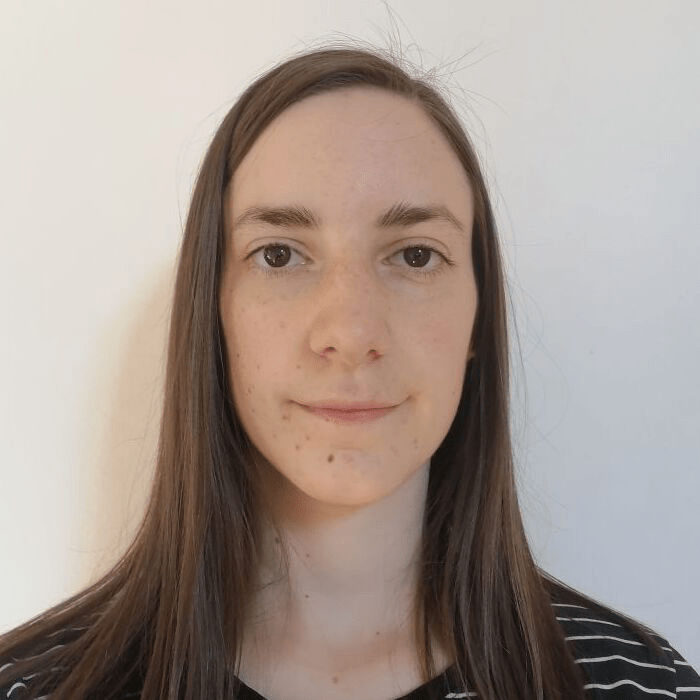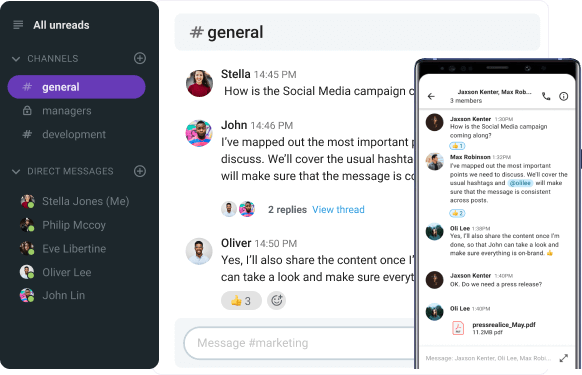Gamers have known all along what others are just starting to realize — it’s possible to collaborate and build strong communities in a virtual setting.
But, what’s it like for distributed game development teams who create games remotely?
Do they too find it easy to collaborate on developing the games we enjoy so much?
We could say that the game development industry was much better prepared for switching to hybrid and remote work models. However, it’s not without its challenges.
We reached out to Ryan Vandendyck, the founder of the game development company Eden Industries, to talk about these challenges.
For this blog post, we had a chat with Ryan about Eden Industries and covered the following topics:
- The difficulties of starting a game development company,
- The importance of giving back to the community,
- The challenges of heading a distributed team,
- The way Pumble has helped Ryan and his team communicate and collaborate, and
- Ryan’s tips on streamlining communication in a remote environment.
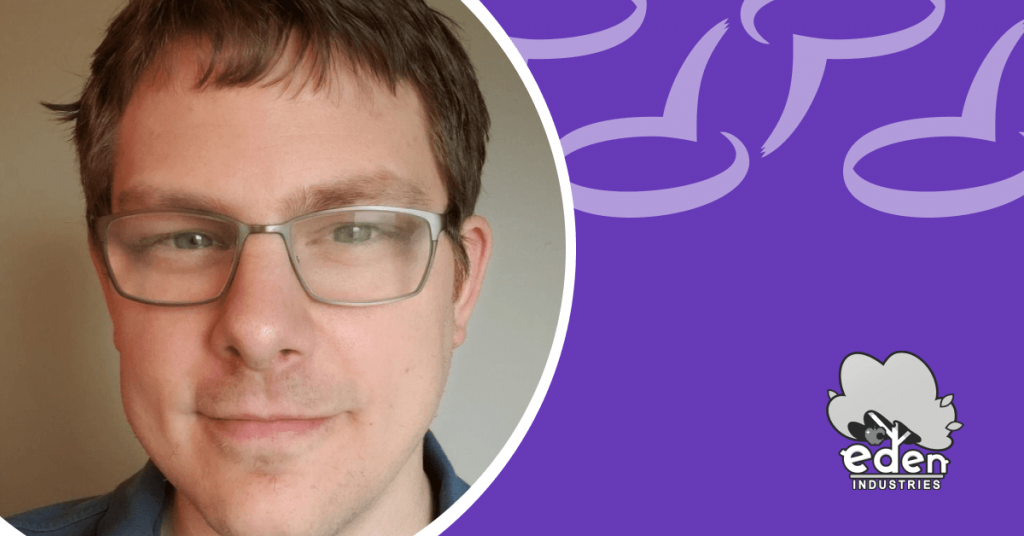
Table of Contents
A quick introduction to Eden Industries
Ryan heads Eden Industries, a Canadian-based indie game development company that combines classic retro gameplay with modern design, functionalities, and story.
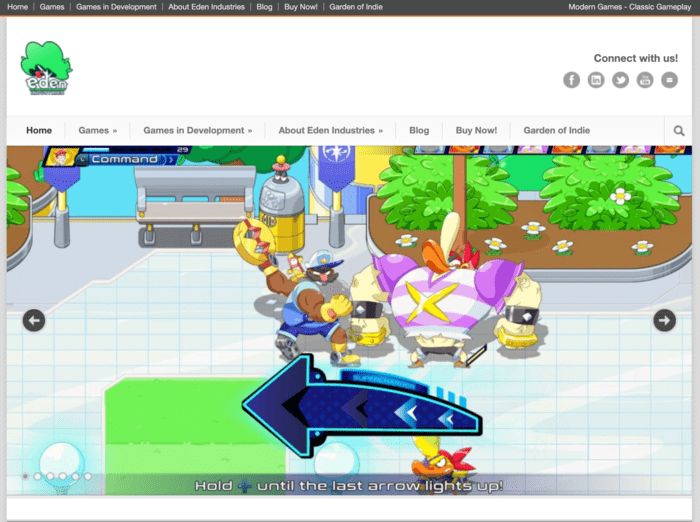
Their games are witty, fun, sleek, and nostalgia-inducing.
But, although they pay homage to the classic titles of the past, they don’t merely recycle them.
They take the familiar retro format and freshen it up by introducing state-of-the-art design and brand new content.
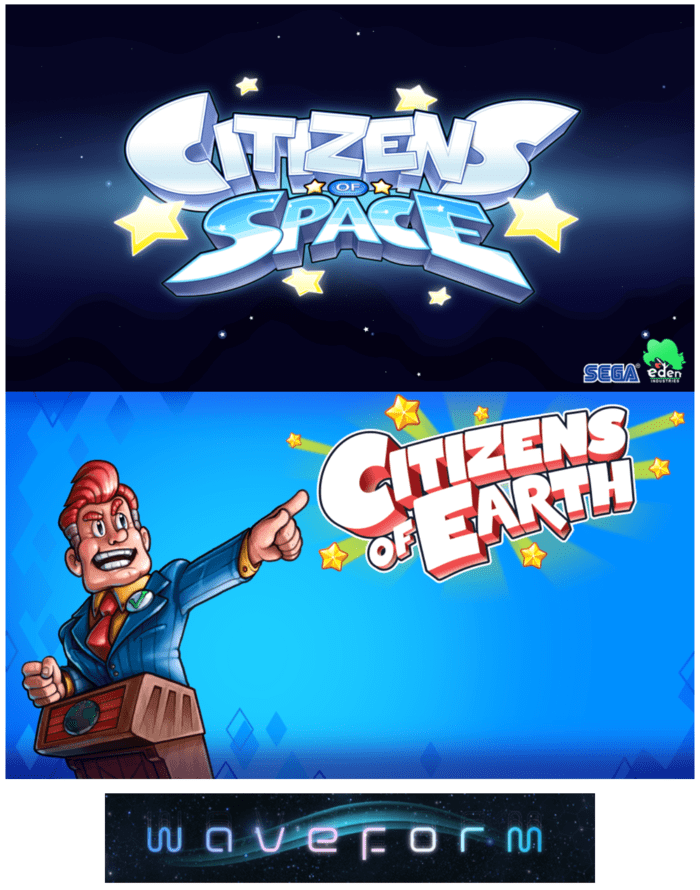
Whether you’re recruiting townspeople to fight hippies and angry toasters (Citizens of Earth) or riding a wave of light through a mind-boggling galaxy (Waveform), you’re sure to have tons of fun.
How Eden Industries started
Eden Industries games manage to be simple yet ingenious because Ryan and his team pour their heart and soul into every project.
Ryan’s passion for gaming started at a young age, and he knew early on that developing games would be his vocation.

“Ever since I was very, very young, I’ve loved video games. So, 4 years old — I was playing games. And, I would beat the games so fast that my mom didn’t know what to do. She would find video games, I would beat them, so eventually, at 8 years old, she said, ‘You know what, Ryan, you should just make games then.’ I was like — that is a good idea. So from 8 years old, that was my plan.”
Most people never fulfill their childhood dreams, but Ryan was resolute that he would follow through with the plan he made as a child. Doing anything else just wouldn’t cut it for him.
Throughout the years, he worked hard toward realizing that dream, and eventually, Eden Industries happened.

“I went to university, studied computer science. Right out of university, I was working on making games. And again, I just had so many things I wanted to do, so many games I wanted to make, I was like — I gotta make my own company, it’s gotta happen. So in 2010, I started the company.”
At the time, Ryan was still doing side jobs to support his dream. But, on January 1, 2012, he took a leap of faith and quit his other jobs to focus all his energy on his passion — his company.

“By 2012, I quit my other jobs to do this full-time. I’ve been doing Eden Industries full-time for 10 years out of that overflowing desire — I gotta make games, I gotta do it.”
The challenges of starting a game development company
Starting a company is always difficult, but launching a game development business comes with its own sets of challenges.
Here’s what Ryan says were the biggest hurdles he had to overcome to see his company soar.
Challenge 1: Long product life cycle
Games don’t just happen overnight. Great ones take a lot of hard work over years until they reach the gamer.
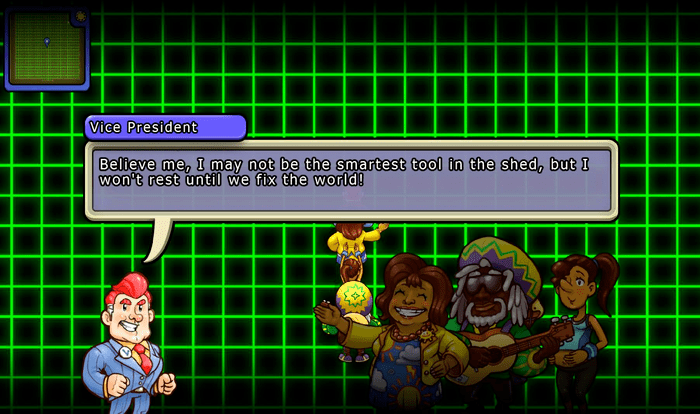
And, once a game gets on the market after years of work and dedication, there’s no guarantee it will be well-received.

“[Running a game development company] is difficult for a lot of reasons. Number one, we’re making big products that take years to make. So, you really have to have a long-term vision. It’s not just like — I’m gonna open a store, and it will take a month of customers coming in on a daily basis. This is like — I’ll spend the next two years making something, put it out there, and hope someone wants to buy it. So, in terms of that product life cycle, it’s just very challenging.”
Challenge 2: Getting the right people
Developing video games is a complex and demanding process. It requires a strong team of highly skilled individuals who can see the product through.
Finding the right people for the job was not an easy task, but it never fazed Ryan.

“It is a technically demanding industry. You need people that are very highly skilled at very specific things. So, it is a big challenge to get the right people and the resources and put the product out there. But, at the same time, if that’s your passion, and that’s what you want to do, then, there’s nothing else — that’s it, you know?”
When Eden Industries started, it was just Ryan working from his basement studio and some part-time employees he could afford at the time.

“I had some very part-time artists — a very, very part-time audio person, one guy was helping me out with programming a little bit, with making levels. But, it was mainly me, and then, other people contributing little bits here and there just based on what I could pay them. So yeah, very humble, modest origins — just me and my basement studio at my house.”
Since those beginnings, Ryan has managed to find the right people and is now running a distributed team.
Challenge 3: Video games not being a typical product
Video games are not a typical product. The process of making them is not as straightforward as, say, making a chair.
There’s a lot more open-endedness and creativity involved in the creation of video games, which can be challenging at times.
That’s because there’s no right or wrong answer as to how you should make them.
You just have to follow your gut and hope for the best.

“With a lot of products, you just have to make it the right way. Then, it does the job that that product is meant to do, and then you’re done. But, with games sort of being this fusion of art and technology, there’s really no [one] answer. It’s just very open-ended and creative, but with this sort of cutting-edge technological backbone going through it. So, this is like a really weird fusion of ideas, of this massive open-ended creativity, and really core technology coming together in a way that has no real answer.”
For Ryan, pulling all these different threads and people working on them together can be quite challenging.
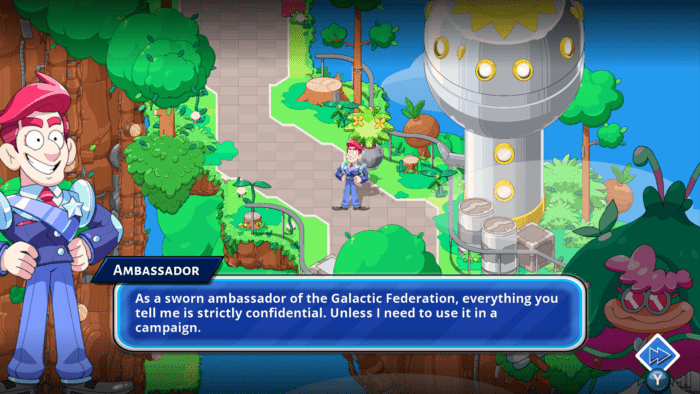
Nurturing a community spirit — The Garden of Indie initiative
Since Ryan is acutely aware of how difficult it can be to develop games, he’s started the Garden of Indie project to help other indie developers.
The Garden of Indie is an initiative that helps indie developers realize their vision through collaboration and partnership instead of a traditional publisher/developer funding model.
It sprang from Ryan’s genuine wish to help others overcome the challenges he’s been through.

“I realized, like — wow, this was a lot of hard work. I bet you other people are having struggles, but are still working on something that’s really cool, and they just need help. And I thought, ‘Man, I wonder if we can sort of help people just overcome some of the troubles that we had’.”
How Eden Industries helps the community through Garden of Indie
Instead of funding, Eden Industries offers indie developers something much more valuable — experience and internally built technology.

“I really saw that there’s this sort of not a one-size-fits-all solution, but a really tailored, customized solution to give back to the broader game development community and say — Hey, we had a lot of struggles, trying to start up especially. Maybe there’s a way we can help you in a unique way that’s specific to what you need, not just throw money at you, and then take all of what you’ve gained out of it.”
This kind of noble project is not always easy to run. Ryan admits there are ups and downs, and some developers give up when it gets hard.
However, the fact that there are people who really value the technology Ryan’s team provides them with is more than enough.

“It’s ups and downs, but overall, it’s something I believe in — trying to give back, help people, and see if they can overcome some of the hurdles that I had to slam into along the way.”
When asked how he chooses the people to collaborate with through the Garden of Indie initiative, he shared two vital criteria:
- A clear vision, and
- A technological foundation.
A vision alone is not enough because people need to have the technical know-how to make it a reality.

“You need to have a good vision, something that you’ve created. But, you then also need to have the technological foundation to take what we’re giving you and see it through to the end. And, given that games are hard to make, that combination of people is kind of rare — so we don’t do this a ton. But, for the right groups of people, I think it is just the right mix of taking their seed and kick-starting it into what they need, and what it can be.”
Garden of Indie approach in Eden Industries’ game development
The games Eden Industries has released so far have all been internal projects.
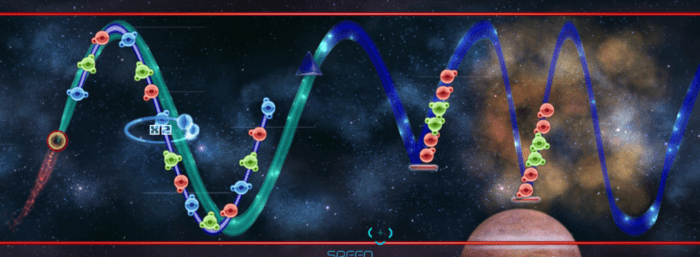
However, Ryan and his team have embraced the Garden of Indie style of collaborative work. There are currently two games in the works that are true to the Garden of Indie initiative.
The first game is due to be released later this year.
Ryan describes how the project came about:

“It was basically a guy I’ve known and worked with for a long, long time. He had a really interesting game design, and he wanted to utilize the game engine that we’ve built and developed, so that’s coming along now pretty well.”
The other game in development right now is a similar collaborative project. It started with another development team reaching out to Ryan to ask him a couple of questions.
In the process, Ryan realized that they might benefit from Eden Industries’ internal technology.

“So, I answered the questions, and while I was talking to them, I realized, ‘you’re making something that could maybe really benefit from the technology that we have’ — because some of their questions were about some technological problems they were having. So, we’ve been working with them since they reached out.”
Ryan points out that the second game is a kind of a slow burn and will probably come out next year.
But, Garden of Indie lives and helps indie developers learn from each other and collaborate.
Ryan’s collaboration with people around the world
Most of the people Ryan works and collaborates with are based in Canada.
But, throughout the years, he’s worked with people from all over the world.

“A lot of our animators have been in the USA. We had an artist from South Africa. A lot of our translators are from Europe. We had an audio guy from Indonesia. We had a little bit of outsourcing from Hungary back in the day.”
Luckily, he’s no stranger to organizing a distributed group of people and has found ways to overcome any potential collaboration obstacles and communication issues.
Running a distributed team
The Eden Industries core team now numbers 20 people, and they rely on a remote-first work model. The team occasionally meets up, but they mostly work remotely.
Even though Ryan now manages a remote team, they were office-bound at first.
Ryan explains why they had to have an office.

“The game development landscape of a decade ago was a bit different than now. For example, we wanted to keep making games with Nintendo that I had done in my previous jobs, and it required an office. It wasn’t even a choice. You had to have an office in a commercially zoned area of the city. So we had to do it.”
Once the pressure of the industry to have a physical office lifted, Ryan thought it was only reasonable to go fully remote.

“Once that requirement [to have an office] was no longer true, it was like — What are we doing? This doesn’t make any sense. We’re spending all of this money renting a tiny office, and everything we’re doing is on a computer anyway. We don’t really need to be beside each other.”
Challenges of running a distributed team
Distributed teams working remotely have a harder time staying connected and can run into difficulties that office-based businesses don’t have to worry about as often.
In Ryan’s view, one of the biggest issues to worry about when managing a remote team is helping people stay productive and organized.

“Heading all together in the right direction can be hard. I can’t just turn to my side, see what they’re working on, and be like, ‘Oh no, no, no, I wanted it a different way.’”
The issue with the organization usually stems from a different underlying problem common in remote teams — communication breakdown.
Ryan believes the right communication tools can make a difference.

“That disconnect can really make it hard, which is why communication tools are very important to make sure we’re all connected and communicating. We can easily find what we have agreed upon before. Also, chat histories are important. Having good communication tools is absolutely critically essential for this kind of distributed team.”
The tools Ryan’s team uses for collaboration within his distributed team
A great way to stay organized, productive, and connected as a remote team is to use the right software.
Ryan’s team relies on a trifecta of tools that keep their work, collaboration, and communication on track:
- A source control server — A centralized system where developers upload their work and track changes to the project,
- A project tracker — A tracking tool on their website that allows them to see a breakdown of project tasks, what everyone’s working on, a project timeline, etc., and
- A communication tool — Ryan and his team started out with Skype, then switched to Slack as the team grew, and finally settled on Pumble. They have been using Pumble for communication and collaboration for about a year now and are more than satisfied.
We were curious to hear how Ryan and his team found Pumble and how they use it in their daily communication.
How and why Eden Industries relies on Pumble for communication
As mentioned, initially, long before they started relying on Pumble, Ryan and his team were using Skype.
It was alright for the time being — but when the pandemic hit, the team switched to Slack looking for better features.
But, Slack wasn’t an ideal solution for his team either.
Ryan explains why.
The main challenges Ryan and his team had with previous communication tools
As Ryan explains, the main problems with Slack were:
- Highly limited message history, and
- Anti-synergy with the company’s growth.

“[The problem with Slack is] the more you grow the company, the faster you hit that limit. So, when we first started using Slack, there were two or three of us, and it wasn’t that bad because we could look back at messages from months and months ago, almost a year I think. But then, things were picking up, I was hiring a lot of people. It was a month, and that was all [the message history] we had.”
So, Ryan felt that as the company grew, the app became more and more constricting.
He switched to the paid plan. But, he almost felt penalized for every new person he would bring on, as subscription was getting hugely expensive.

“So as we grew, it actually became a worse and worse fit, which is not really what you want your tools to do. You want them to grow with you, not restrict you as you grow.”
That’s why Ryan and his team started looking for a new communication app.
How Ryan found Pumble
The Eden Industries team was looking for Slack alternatives when Ryan’s art director stumbled on Pumble.

“He said, ‘This tool looks kind of like Slack, so we’re not learning anything new, and it’s by the team that made Clockify, which was very well regarded.’ We didn’t actually use it, but we saw that people really love this thing. It’s well regarded, the team has a good pedigree, so we like that. And, I looked, and I was like — hey, you know what, the pricing scheme on Pumble actually is reasonable.”
Apart from the intuitive interface, trustworthy team, and reasonable price plans, there was another crucial factor that made the team choose Pumble — no message history limit.
They could access messages dating back as far as they needed to.

“So there’s no message limit, it’s similar to what we already knew, has a sensible pricing scheme, is built by people who had good tech already — so [Pumble] was really ticking all the boxes.”
What changed when Eden Industries switched to Pumble
In remote businesses, it’s vital to have a written record of everything you do and every decision you make.
When everything is put in writing, you don’t have to rely on your memory — it’s a quick search away whenever you need it.
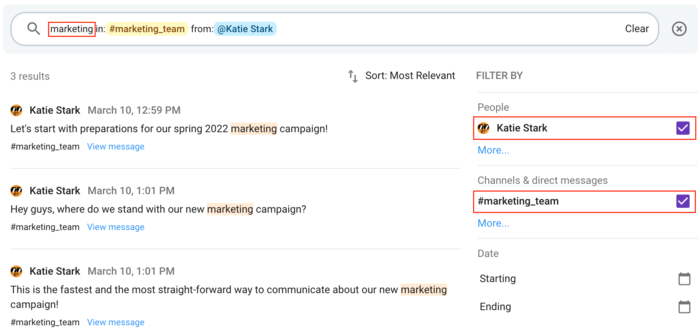
That’s why Pumble’s unlimited message history has brought Ryan peace of mind.

“I’m not paranoid about losing message history anymore. So, I know if I talked to my art director about something six months ago, I can just go find it. It’s made me a lot less stressed about forgetting or losing access to the decisions we’ve made, the plans we’ve made.”
There’s another crucial change Pumble has made for Ryan:

“What [Pumble] did was what a good communication tool should do — which is allow you to focus on the work, not the tool itself. So, that’s what it did — it kinda faded into the background, so I don’t have to worry about all these little things. It just lets me get down to business.”
💡 Pumble Pro Tip
Do you find your communication app distracting? Here’s what you can do to eliminate team chat app distractions:
What Ryan likes the most about Pumble
Apart from the unlimited message history, reliability, and trustworthiness, Ryan loves that Pumble makes chatting easy.
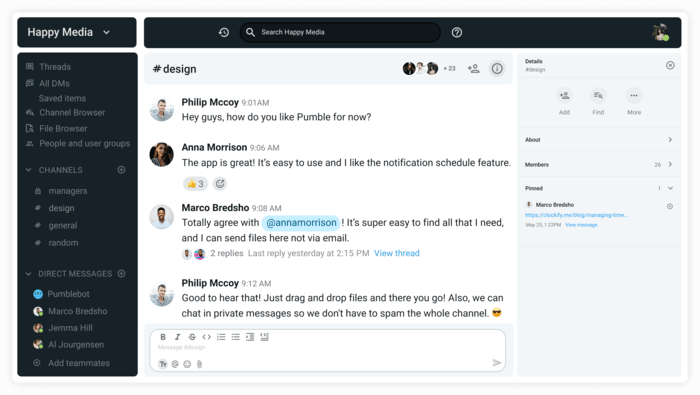
When he looks for a tool, he doesn’t care about the bells and whistles — he just wants the app to do what it set out to do.
In this case, what Ryan wants from a communication app is — the ability to easily communicate.

“It’s kinda funny because, sometimes, the thing I want most from a chat app is just — chat. And, some of these other tools, it just feels like they’re focusing on so many supplementary things that they’re losing the point of why I wanted them. Pumble makes chatting with people, in groups and threads, just easy. That’s what I want. I don’t need the crazy supplements, I just need it to do the core thing. And so, that’s what I like about Pumble — It’s focused, it does what it set out to do well.”
Ryan would recommend Pumble to anyone in the game development industry and beyond.

“I’d literally recommend it to anyone collaborating on anything, especially if you already know Slack, and I think most people, at this point, do. There’s no reason not to switch in my mind. You know, there are some pros and cons of both. I’m not saying, in literally every aspect Pumble is better. But, on the whole, it’s way better, and it has similar features, so I’d recommend it to everybody.”
Ryan’s advice on streamlining communication in a remote team
In essence, Ryan believes two things are crucial for streamlining communication in a remote team:
- Good organization, and
- Access to your chat history.
Advice #1: Organize your communication
It’s essential to organize your communication well so that everyone understands what communication channels to use in which situations.
Pumble allows users to sort their conversations via:
- Public and private channels,
- Personal DMs,
- Group messages, and
- Threads.
The lack of the ability to organize conversations within the app was the biggest nuisance with their first communication app — Skype.

“You need a way to organize the different kinds of lines of communication, and this is where, for us, Skype started to get really hard as we were adding more people. There are no threads in Skype, and they kind of layer the group chat, which makes it really hard to keep track of who was in what conversation and what we talked about.”
💡 Pumble Pro Tip
See how you can organize your communication in Pumble:
Advice #2: Ensure you have access to your chat history
Ryan has repeatedly emphasized the importance of not losing your chat history. In his view, it’s vital to have access to everything you’ve discussed with your team.

“Don’t lose access to your history. And actually, this is where Skype was really frustrating because Skype ostensibly has a chat history, but it’s almost basically unusable. The search is just mind-numbingly frustrating.”
Again, Ryan compares Pumble to the communication tools they previously used and explains why it’s better in terms of chat history.

“So, you need good organization, and you need access to your chat history. Skype said they had it, and they don’t really. Slack — you need to pay through the nose to get it. Whereas Pumble just has it.”
When core values align: Authentic people making cool stuff
Eden Industries and Pumble are simply a great match — and not just because Pumble’s features fit Ryan’s team’s needs.
Eden Industries was built out of a genuine passion for gaming, and Garden of Indie is proof of their care and support for the community.
Ryan’s business is not a corporate money-making machine, but rather a company that truly cares about what they do.
That’s what Ryan likes about Pumble too — our core values seem to align.

“As someone who built a small company from the ground up, I kind of like authentic technology companies. And, that’s why I like Pumble too. For example, we’re doing this (referring to the interview), or I messaged people in support, and they got back to me, we talked. I like that because that’s kind of who I am, where I started — just human, authentic people trying to make cool stuff. So, that kind of really resonates with me and is another reason why I like Pumble. Just putting aside the uses of it, which are great, the core values, the essence of it, resonates with me. I like that.”
✉️ If you’re a Pumble user (or also use Clockify and Plaky, within the CAKE.com Bundle) and you’d like to have your own customer story featured on our blogs, reach out to us at pr@cake.com!
